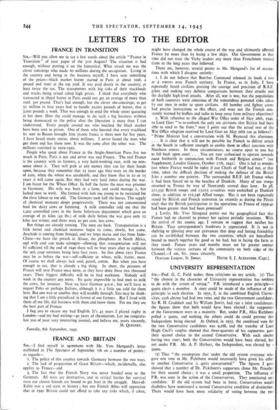FRANCE AND BRITAIN
find myself in agreement with Mr. Yves Mengand's letter published in The Spectator of September 7th on a number of points: as regards—.
1. The policy of this country towards Germany between the two wars.
2. The lack of preparation of Great Britain—which, incidentally, also applies to France--and 3. The fact that the French Navy was never handed over to the • Germuns. All wars are destructive, and in critical battles for survival even our closest friends are bound to get hurt in the struggle. Mers-el- Kebir was a sad stain in history ; but our French Allies will appreciate that in 1940 Britain could not afford to take any risks which, if taken, might have changed the whole course of the war and ultimately affected France far more than by losing a few ships. Our Government at that time did not trust the Vichy leaders any more than Frenchmen trusted them in the long years that followed.
There are, however, several points in Mr. Mengand's list of accusa- tions with which I disagree entirely:
1. I do not believe that Bomber Command released its loads a tort et a travers over French territory. In France, as in Italy, I have
repeatedly heard civilians praising the courage and precision of R.A.F.
pilots and making very definite comparisons .between their attacks and the daylight high-level attacks. After all, war is war, but the populations of both countries were conscious of the tremendous personal risks taken by our men in order to spare civilians. All bomber and fighter crews had precise instructions to this effect, and were not the French con- stantly warned by leaflets and radio to keep away from military objectives?
2. With reference to the alleged War Office order of May 26th, 1940, to Lord Gort "to re-embark the only ten divisions that Britain had been able to send to the front," may I point out that the actual text of the War Office telegram received by Lord Gort on May 26th ran as follows?: "Prime Minister had a conversation with M. Reynaud this afternoon. . . . It is clear that it will not be possible for French to deliver attack in the South in sufficient strength to enable them to effect junction with Northern armies. In these circumstances, no course open to you but to fall back upon coast. . . . You are now authorised to operate towards coast forthwith in conjunction with French and Belgian armies" (see Supplement, London Gazette, October 17th, 1941). One is led to wonder just where France would be today if our Chiefs of Staff had not, at that time, taken the difficult decision of making the defence of the British Isles a number one priority. The surrounded B.E.F. left France when it had been forced on to the beaches of Dunkirk. Many of our troops
returned to France by way of Normandy several days later. In ‘all,
211,532 British troops and 13,053 cesualties were embarked at Dunkirk alone, in addition to 112,546 Allied troops. Has it not been repeatedly stated by British and French statesmen (as recently as during the Petain trial) that the British participation in the operations in France of 1939-40 had been greater than had been promised?
3. Lastly, Mr. Yves Mengand points out the geographical fact that France had no channel to protect her against periodic invasions. With the arrival of the atomic age, I venture to suggest that neither has Britain. Your correspondent's frankness is appreciated. It is not in shelving or glossing over our grievances that deep and lasting friendship can be established between the two countries, • which are henceforth bound to march together for good or for bad, but in facing the facts as they stand. Future years and months must see far greater contact between the various sections of the community on both sides of the Channel.—I am, Sir, yours sincerely,


























 Previous page
Previous page